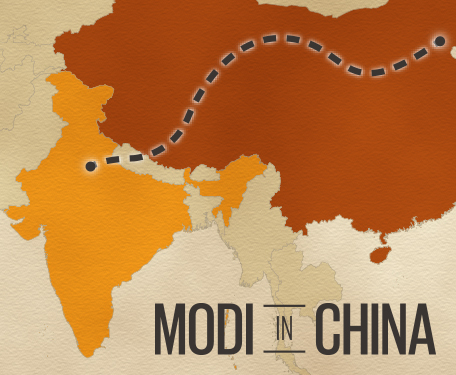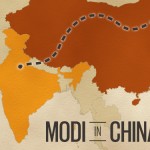
Prime Minister Narendra Modi is in China from 14-16 May, his first visit to China as prime minister and his second bilateral summit with Chinese President Xi Jinping. India and China share a bivalent relationship, simultaneously cooperating and competing on a number of issues ranging from trade and energy to security and terrorism.
Featured below is collection of Gateway House articles, videos and podcasts on India-China relations.
India-China relations
India 2015: China Check or Mate? By Akshay Mathur with research team
From the Indian perspective, how China manages the readjustment of its economy and how secure South Asia remains, will be two major determinants that will influence world affairs in 2015. Gateway House has developed four scenarios to explain the outcomes that will ensue, starting 2015, when these two determinants intersect.
China’s connectivity tips for India by Karan Pradhan and Dev Lewis
A major theme at the multilateral summits this month was connectivity, with China at the forefront. India is trailing behind due to a shortfall in investment and political will, among other factors. Prime Minister Modi must follow up on his meetings at the SAARC Summit by robustly taking forward India’s connectivity agenda
Co-designing the new Silk Road by Rajni Bakshi
China’s Silk Road Economic Belt initiative will feature prominently on the agenda when Prime Minister Modi visits Beijing and Shanghai on 14 May. India can make a strong move to co-design the framework and details of this initiative – making it truly collaborative and win-win for all of Asia
The China Discourse in India by Shai Venkatraman and Dev Lewis
India has viewed China through the lens of suspicion since the 1962 war. Despite the two countries moving forward on the economic front, negative public perception persists. The Indian news media has a role in this, playing up stereotypes instead of building bridges
New-Look India-China ties in 2015? By KJM Varma
2015 is likely to begin with India-China boundary talks in New Delhi, and strategic analysts believe it can be a unique window—arising out of the new political dynamism in both countries—to resolve the dispute. Besides, if Modi visits China in 2015, it can expedite investments—also making it a big year for bilateral ties.
The elusive Chinese rebalance to India by Tim Willasey Wilsey
The shifting geopolitics in Asia presented an opportunity for China to rebalance its relations with India during the visit of President Xi Jinping to New Delhi in September. However, the meeting proved to be another missed opportunity for the two countries
A year of India-China Friendship by Saumya Pant and Dev Lewis
2014 was celebrated as the year of India-China friendship with many joint high level diplomatic, defence and cultural events to strengthen relations. The cities of New Delhi and Mumbai will see the debut of the Chinese Kunqu Opera to mark the close of the year.
Trade and economy
Xi to Modi: “Here’s my shopping list” by Chris Devonshire-Ellis
With a massive, yet demanding middle class, the Chinese Communist Party needs a reliable source of cheap labor to continue to allow Chinese nationals to enjoy mass-produced daily products. step forward India, mass producer
India China: Evolving Geoeconomics by Akshay Mathur
The trade deficit and border issues have usually overshadowed the public discourse between India and China. However, below this surface, bilateral business and financial engagement is growing. India will have to engage judiciously with China to ensure that the resulting geoeconomic benefits remain in our favour.
Preparing for the Chinese-Indian century by Kishore Mahbubani
Contrary to conventional wisdom, the positives outweigh the negatives in the India-China relationship. Both countries share a common opportunity to grow their economies exponentially and much will depend on the tone set by Prime Minister Modi and President Xi when they meet in Xian this week
India-China trade: China’s $300 billion investment offer (video)
Gateway House speaks to Chris Devonshire-Ellis, Founding Partner, Dezan Shira & Associates, on China’s offer to invest $300 billion in India’s infrastructure over the next five years, India’s potential to become a manufacturing hub for the Chinese economy, and what the visit of President Xi Jinping to India at the end of 2014 could mean for bilateral relations.
Why China must invest in India by Chris Devonshire-Ellis
Discussions at the recent India-China Strategic Economic Dialogue in Beijing focused on Chinese investment in infrastructure in India. China’s strategy of funding projects in India comes from practical necessity – to meet the demands of China’s growing middle class for affordable, market based services
Pakistan and Yidai-Yilu (One Belt-One Road) (podcast)
Gateway House interviewed Jabin Jacob, assistant director and fellow at the Institute for China Studies, New Delhi, on the relationship between China and Pakistan, the China-Pakistan Economic Corridor (CPEC) as well as China’s one belt-one road initiative.
Director, Gateway House, comments on how this railway line can economically transform the region and what the geopolitical impact of such a transformation might be.
Defence and Security
OBOR and India’s security concerns by Sameer Patil
While China will seek India’s cooperation on its ambitious ‘One Belt, One Road’ project during Prime Minister Modi’s visit this week, Indian policy makers must soon articulate a definite stand on this transnational corridor by bridging the country’s security concerns and the benefits of such an engagement with China.
Talking defence budgets: India and China (podcast)
India and China both recently released their defence budgets for 2015-16. Sameer Patil, Associate National Security Fellow, Gateway House, breaks down the Indian budget and what it means for India’s security vis-a-vis China. He also takes a closer look at China’s defence budget and the aspects that reflect the PLA’s growing stature.
China’s growing role as a weapons exporter (podcast)
According to the latest Stockholm International Peace Research Institute report(2009-14) China is now the world’s 3rd largest arms exporter. Dev Lewis talks to Neelam Deo, Director and Sameer Patil, Associate National Security Fellow, about the significance and possible reasons for China’s rise as an arms exporter.
China’s Defence Budget 2014 (video)
China recently announced its budget for 2014-2015, with US$132 billion allocated to military expenditure, an increase of about 12% since the previous year. Sameer Patil, Associate National Security Fellow, Gateway House, highlights and analyses the important components.
Geopolitics with M.D.Nalapat: Afghanistan, China, Pakistan, ISIS (podcast)
Dev Lewis interviewed M.D. Nalapat, director of geopolitics at Manipal University, on a number of topics including: India-Afghanistan relations, the China-Pakistan Economic Corridor and the One Belt-One road initiative, role of Iran in West Asia and the migration of North Africans to southern Europe.
China: politics, economy and society
Economic reforms with Chinese characteristics by Dev Lewis
The 2013 third Party Plenum of the Chinese Communist Party revealed a raft of economic reforms. While questions remain about how they will be implemented, the party leadership will be bold in an attempt to regain China’s lost glory.
Comprehensive reforms in China? by Dr. Varaprasad S.Dolla
The annual meeting of the National People’s Congress in Beijing in March covered wide and significant ground, including President Xi’s vision of deepening reform and law-based governance. The meeting also emphasised environmental protection and enforcement of IPR. But the outcome of these plans remains to be seen
Controlling Cyberspace in China by Dev Lewis
Across the globe, governments trying to control the internet are violating the privacy and rights of internet users. China’s censorship model is limited to its borders, the U.S.’ surveillance affects everyone internationally. A multilaterally-acceptable mandate for cyber governance is now an imperative
Can Uber in China counter local e-taxis? by Jack Marr
Although Uber has a $41billion global valuation, over 99% of the taxi app market in China is controlled by local competitors offering personalised services, informal networks, and a familiarity with regulations that Uber cannot match. In such a scenario, can Uber live up to its valuation? And will local entities eventually also have an advantage in the crowd-sourced trucking and waterways sectors
China’s ebanks: a new regime by Jack Marr
WeBank, China’s first online-only bank has been launched with great expectations. It can potentially reform the country’s mismanaged financial sector by opening up credit to private SMEs and prove a model for other developing countries.
China’s e-commerce and internet space (podcast)
China’s e-commerce and internet giants-Alibaba, Xiaomi, Tencent- have become serious players in India.
In this episode we discuss China’s e-commerce and internet landscape: what the unique factors are, what the challenges are, and what can India learn. Dev Lewis is joined by Jack Marr, Professor at City University Hong Kong; Jared, founder of CinnaSwirl and Mind Spark Press, two start-ups in Shanghai; Patrick, Wei Wo go, an O-to-O e-commerce company, and Penny, a sales executive at an LED and chip manufacturing company in Shenzhen.
The geopolitics and geoeconomics of the Yixin’ou train (podcast)
On February 24,2015, the Yixin’ou train made its first journey back to Yiwu, China, from Madrid, Spain. The Yixin’ou line spans 7 countries, covering a distance of more 13,000 km, making it the worlds longest railway line. In this podcast Neelam Deo, D
© Copyright 2014 Gateway House: Indian Council on Global Relations. All rights reserved. Any unauthorized copying or reproduction is strictly prohibited.


